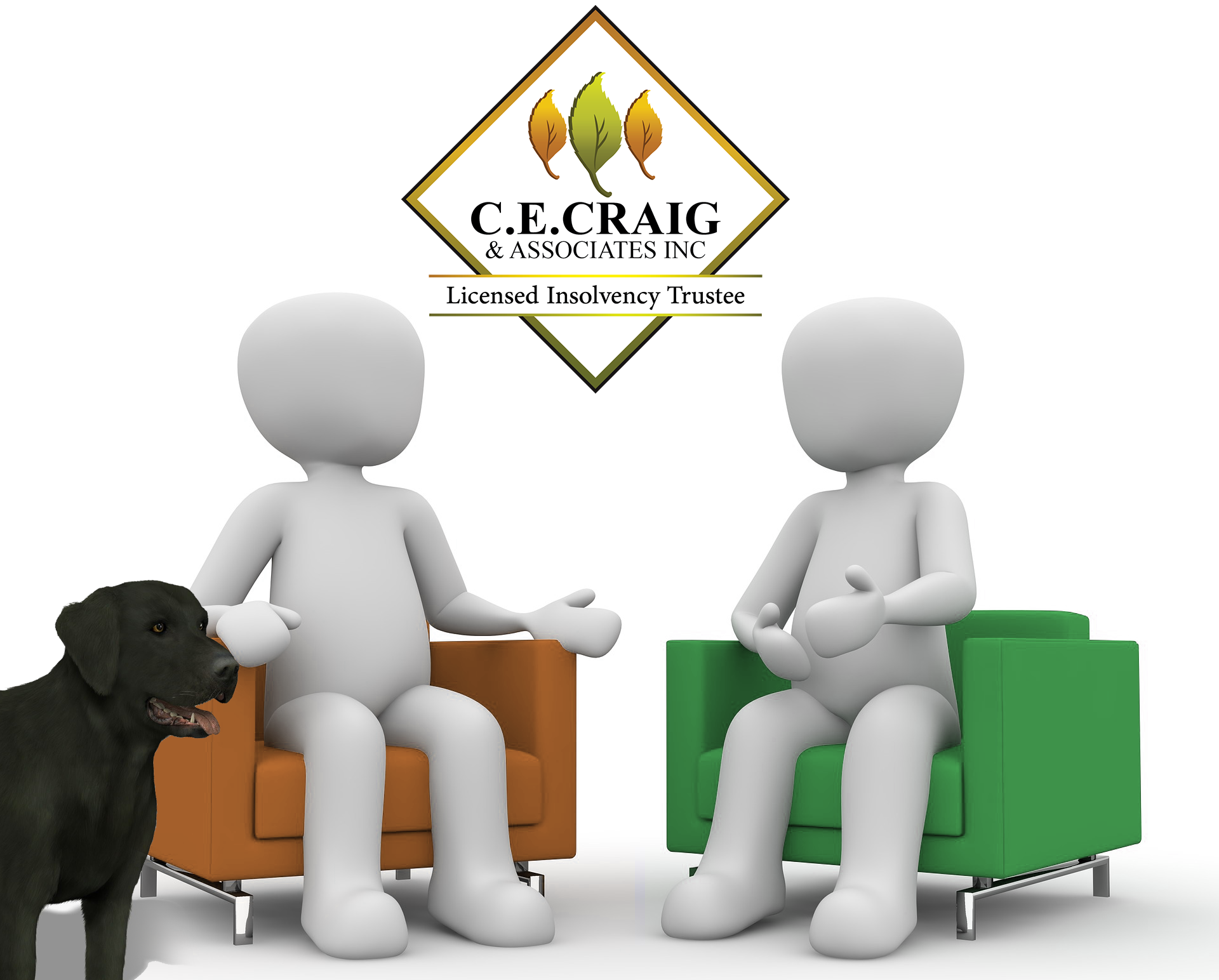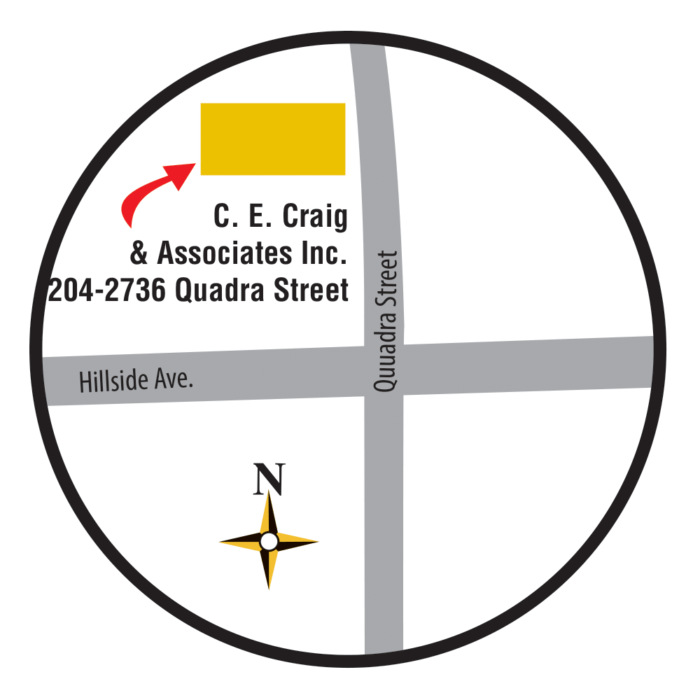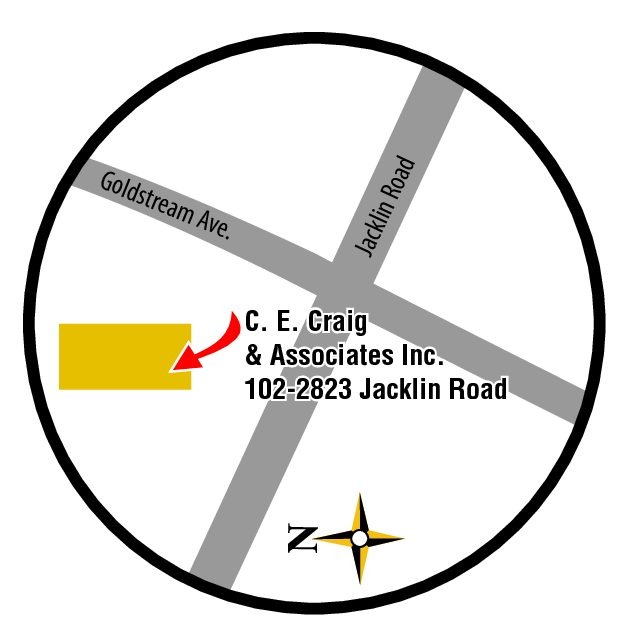C.E. Craig & Associates Inc.
PERSONAL BANKRUPTCY

What is Personal Bankruptcy?
Personal Bankruptcy is a legal process regulated by the Bankruptcy and Insolvency Act in Canada. It provides immediate relief for an individual burdened with a crushing debt-load. It is designed to provide financial protection for debtors who can no longer afford to repay their debts.
Filing for bankruptcy is not the only debt relief option, but sometimes it is the best solution to a debt problem.
Bankruptcy is generally for those who cannot pay their debts in a reasonable period of time, or who have determined that other debt settlement options, such as filing a Consumer Proposal, are not viable solutions for them.
To file a Bankruptcy or a Consumer Proposal in Canada you must seek the assistance of a Licensed Insolvency Trustee.
Who can file for Personal Bankruptcy?
- owes creditors at least $1,000 and;
- Is unable to make regular payments to creditors as they fall due; and, or
- Whose property, at a full evaluation, is insufficient to enable payment of all debts, and
- Resides, does business, or has property in Canada.
If I go bankrupt, will I lose everything?
The quick answer is no, you are allowed to keep basic personal Exempt Assets (the specific type and amount of assets that are exempt varies between provinces), and RRSP’s, pension plan contributions, RDSP’s, and government grants and interest earned in RESP’s (with some variation depending on the time of contribution)
In British Columbia, the amount of personal property that is exempt from seizure or “Exempt Assets” (items that the Trustee cannot take away from you) in the case of a bankruptcy include the following:
- Household goods up to $4,000;
- Tools of the Trade up to $10,000 in equity value;
- Motor Vehicle equity up to $5,000 (reduced to $2,000 for FMEP maintenance debtors);
- Equity in a Principal Residence ($12,000 in the CRD area, $9,000 outside CRD);
- All necessary clothing and all required medical aids (of debtor or dependent)
The LIT will help you value your personal assets before you begin the bankruptcy process. The valuation considered is the equity in each asset. For instance, if you had a vehicle loan, the “equity value” of your vehicle is the value after the secured creditor’s loan was deducted.
Beyond the Exempt Assets listed above, all other assets (except for assets held by an individual in trust for another person), vest in the Trustee for distribution among your creditors.
How much will I have to pay if I declare bankruptcy?
The question of how much a bankruptcy will cost will depend on quite a few factors. To be sure you understand the process, always talk to a Licensed Insolvency Trustee’s to outline the entire bankruptcy process and the potential costs to you before you decide.
As a general overview of cost, some factors to consider are:
- How much you earn each month.
- Value of any assets that are not exempt – above Exempt Assets values,
- Whether or not you have been bankrupt before,
- If your personal tax debts are above $200,000 representing the majority of your debts.
Throughout the bankruptcy process each month that you are an un-discharged bankrupt, you must submit income and expense statements to the Trustee on a monthly basis, showing how much money your family takes home each month. This amount is compared to a federally set income guideline. Any amount above the guideline is considered to be excess income. 50% of this excess is payable to the Trustee and you can keep the remaining 50%. This is the Surplus Income Calculation.
What steps are involved in declaring bankruptcy?
Meet with a Licensed Insolvency Trustee
Initially, our debt elimination managers and Licensed Insolvency Trustee will meet with you to provide an assessment of your situation. This is a free consultation. Our team will help you understand your rights and responsibilities during bankruptcy and will talk to you about other options that may be available (like filing a Consumer Proposal).
If you decide that you want to file for bankruptcy, you will be required to fill in our Application Form to start the process.
Reach out to a debt solutions manager today:
CALL TODAY
FREE CONSULTATION

What is a Licensed Insolvency Trustee?
Does the Licensed Insolvency Trustee work for my creditors?
A Licensed Insolvency Trustee (“LIT”) is licensed by the Office of the Superintendent of Bankruptcy to help people navigate their formal debt elimination programs. A LIT is a debt solutions expert who can help you with a plan to regain financial stability.
LITs are the only professionals licensed in Canada to offer either a bankruptcy or a consumer proposal. LIT’s have a duty to debtors but also to the creditors to be sure that everyone is treated fairly and professionally as outlined under the Bankruptcy and Insolvency Act. Each party has duties and obligations under the BIA, and part of the LIT’s duty is to be sure that the insolvency process is fair and equal for all participants.
Can I file for bankruptcy and include my Student Loan Debt?
Filing for bankruptcy will automatically include all debts. However, Student Loan Debts will only be eliminated when the bankruptcy is finished if you have been out of school for at least 7 years. If you are suffering undo financial hardship, you may also be able to be discharged from student loan debts 5 years after being out of school – “hardship rules”.
Can I get a credit card after I file for bankruptcy?
When you file for bankruptcy, you must turn over all credit cards. And you cannot apply for other sources of credit during the bankruptcy unless you disclose that you are bankrupt. During your bankruptcy process our debt elimination specialists will discuss credit rebuilding strategies included applying for secured credit cards or prepaid cards.
The responsible use of credit is the key first step to rebuilding your credit score.
What happens to my credit rating if I file for bankruptcy?
A credit score is like a grade-point average from school. It is a snap shot of your past to allow creditors to determine the risk in loaning you more money. The less debt you have in the long run, the more likely you will be able to pay back any future loans. Before a bankruptcy, you credit score will most likely already be poor. A bankruptcy will wipe away old, stale debts and allow you to start with a clean slate. In the short term, a bankruptcy will be a negative hit to your credit report, but in the long run, it may be the best way to permanently improve your score.
If I file for bankruptcy, can keep my house? Can I keep my car?
Before your file for a bankruptcy our team will review what assets you own and their values. If you home or car has secured debts against them, then this is taken into consideration. We only look at the equity values (Current Market Value minus Secured Debts -like mortgage or car loan) when considering the value of your assets, minus exemption (see Exempt Assets).
If you have significant equity in your home for instance, then a bankruptcy may not be the best solution for you. Bankruptcy laws requires you to use that equity to pay off your debts.
In any insolvency proceeding, if you have secured creditors like a mortgage or a car loan, then you must continue to make these payments if you want to keep the asset that was pledged as security. The secured creditor rights are not affected by a bankruptcy.
Will it be public information if I file for bankruptcy?
All bankruptcy information is held by the Office of the Superintendent of Bankruptcy. This is a matter of “public record”. The OSB will report your bankruptcy status to the credit bureaus which is information for the clients of the credit bureaus.
Some bankruptcies are reported in local newspapers (where there is more than $15,000 is assets available to creditors), but this is not the case for the vast majority of personal bankruptcies.
Your bankruptcy status is not reported to friends, or families or co-workers.
However, if you are a member of a professional organization, participate in the selling of shares, insurance, or acting as a mortgage broker, are bonded or wish to be bonded, or have a security clearance for military purposes, a bankruptcy can have a negative impact on your status. Before your file a personal bankruptcy, always check with your governing agency or professional association.
What happens if I have co-signed a loan with someone else?
If you declare bankruptcy, you will no longer be responsible for any of your debts. If someone you know has co-signed a loan with you, that personal will assume sole responsibility for paying that debt after your file for bankruptcy. It is always best to inform the other party of your bankruptcy in these cases so they can be made aware of their obligations.
Do I still pay my child support during a bankruptcy?
What about alimony or my Student Loans?
Child support, alimony, and Student Loan debts are all types of debts that are not eliminated with the filing of a bankruptcy. For child support and alimony payments, these are obligations that cannot be Stayed during the bankruptcy and should form part of your monthly budget plan and you should continue to make these current payments.
Child support or alimony arrears take priority in any distributions from your LIT when the bankruptcy is complete.
Student Loans may also be a type of debt that does not get eliminated with a bankruptcy unless you have been out of school for at least 7 years. If the student loans are not going to be discharged, you will continue to charged interest against the outstanding balance of your student loans during the bankruptcy period. During the bankruptcy period you don’t have to make payments to your Student Loans, but you may do so if you first seek the consent of your LIT.
What about my RRSP’s and other investments?
RRSPs are exempt, however, the contributions made in the one-year period before the date of bankruptcy will have to be paid to the Trustee for the benefit of creditors.
Will my spouse be affected if I file for bankruptcy?
No. You are considered on an individual basis. However, if your spouse has co-signed any of the debts, (such as having companion credit cards), your spouse could be left responsible for the entire debt if you file bankruptcy. This is true for anyone who has co-signed on your debts.
Will my creditors stop harassing me?
Yes. By law, all action against you, including garnishments, are halted. Certain debts such as some court fines, court ordered restitution, alimony and child maintenance are not released by personal bankruptcy.
Should a lawyer represent me?
Generally, it is not necessary for a debtor to retain his or her own council. However, it is important to realize that the Trustee is not a lawyer nor does the Trustee represent the bankrupt. Rather, the Trustee is an officer of The Court and has a duty to debtors and creditors to fairly administer the Bankruptcy and Insolvency Act.
Are there any debts that cannot be included in the Personal Bankruptcy?
Certain kinds of debts (including interest) are not erased by the bankruptcy. These include:
- Fines imposed by The Court;
- Debts incurred by misrepresentation or fraud;
- Alimony or maintenance payments;
- Debt for damages imposed by Civil Court for intentional bodily harm, sexual assault or wrongful death;
- Student loans (if bankruptcy occurs within 7 years of ceasing full or part-time studies);
Also, bankruptcy usually does not interfere with secured debts if there is no equity in the secured asset.
What Bankruptcy Duties are expected during the Personal Bankruptcy?
You must fulfil all the following Bankruptcy Duties while you are an un-discharged bankrupt:
- Reveal and turn over to the Trustee all your assets in your possession or control;
- Make available to the Trustee all goods and records relating to personal affairs when requested;
- Attend at the Office of the Official Receiver if and when required, to be examined under oath as to the facts relating to the bankruptcy.
- Provide a complete statement of assets and liabilities, including creditors’ names, addresses, account numbers, invoices, and amounts. Where additional bills or legal documents are received by you, they should be forwarded to the Trustee. If assets or debts were accidentally omitted, the Trustee must be informed promptly;
- Inform the Trustee of the details of all property disposed of during the 12 months prior to the bankruptcy;
- Inform the Trustee of the details of all property disposed of by gift during the five years prior to the bankruptcy
- Inform the Trustee of any material changes in your financial situation.
Also, bankruptcy usually does not interfere with secured debts if there is no equity in the secured asset.
When is my bankruptcy over?
For a first time bankrupt, your are eligible for a discharge at the end of 9 months from the date of your bankruptcy if you have completed all of your Bankruptcy Duties.
If you had Surplus Income payments due in the first 9 months, your bankruptcy will be extended to 21 months.
For a second time bankruptcy, the first eligible automatic discharge date will be 24 months after the initial filing, or if you have Surplus Income, after 36 months.
Could anything prevent me from being discharged from bankruptcy?
Your discharge can be opposed by a creditor, your LIT or the Superintendent of Bankruptcy. Your LIT will oppose your discharge if you fail to perform your Bankruptcy Duties. The most common reasons why your LIT would appose your discharge would be:
- If you failed to make the monthly payments to the LIT
- If you did not attend your two counselling sessions with the LIT
- If you committed a bankruptcy offence under the BIA
Your creditors may oppose your discharge if they feel that a court should determine if you should stay in bankruptcy longer or if you should be asked to pay more to your LIT based on the rules of the BIA.
What types of discharges from bankruptcy are available?
If your discharge is opposed or you have previously been bankrupt, we will arrange for your application for discharge to be heard by the Bankruptcy Court. After hearing our report on your conduct throughout the bankruptcy, your present economic situation, and the opposing creditor’s argument (if any), The Court may issue any of the following orders:
- Absolute: It applies immediately and means that you are no longer responsible for your debts, except for those that cannot be discharged (see debts not included);
- Adjourned: This will postpone the hearing to a later date;
- Conditional: This type is discharge is one where you will be discharged when you satisfy some imposed condition/s such as the performance of a duty or the payment of additional funds to the estate;
- Suspended: You will receive an absolute discharge after a suspended period of time;
- Refused: The Court has the right to refuse to discharge you at all, but this is rarely exercised.
Are you in need of a Personal Bankruptcy on Vancouver Island?
Contact one of our debt elimination managers today. We offer personal, free consultations with
- Video conferencing
- Phone interviews
- In-person interviews
Reach out to a debt solutions manager today:
CALL TODAY
FREE CONSULTATION
OUR TEAM

COLLEEN CRAIG
Colleen founded C.E. Craig & Associates Inc. in 2003 after 10 years in the insolvency industry. As a federally licensed Trustee in Bankruptcy she deals with the day-to-day issues that creditors and debtors encounter when they are faced with Insolvency situations. As a Chartered Accountant, Colleen brings a pragmatic approach to dealing with the complex matters and finding the right solution for all parties.

JANET WHITE
Janet has been with C.E. Craig & Associates Inc. since 2003, when the company opened. She helped build the practice from the ground up, giving her a thorough understanding of the ins and outs of insolvency legislation and procedures.

LESLEY BENTLEY
We were pleased to welcome Lesley Bentley into our firm in 2013. She has been an Estate Administrator for over 30 years offering advice to individuals struggling with personal financial issues.

BADGER
No formal insolvency training, but also non judgmental, loyal, and cute.
Reach out to a debt solutions manager today:
CALL TODAY
FREE CONSULTATION
CHECK OUT OUR BLOG
Your Big Blog Post Title Will Be Here
An excerpt of your post content will show up in this section so blog visitors can have an idea on what this post is about before they click it to see the post content. You can create your posts from your blog funnel dashboard.
Read More0 Views
Write a Comment
Read MoreYour Big Blog Post Title Will Be Here
An excerpt of your post content will show up in this section so blog visitors can have an idea on what this post is about before they click it to see the post content. You can create your posts from your blog funnel dashboard.
Read More0 Views
Write a Comment
Read MoreYour Big Blog Post Title Will Be Here
An excerpt of your post content will show up in this section so blog visitors can have an idea on what this post is about before they click it to see the post content. You can create your posts from your blog funnel dashboard.
Read More0 Views
Write a Comment
Read MoreYour Big Blog Post Title Will Be Here
An excerpt of your post content will show up in this section so blog visitors can have an idea on what this post is about before they click it to see the post content. You can create your posts from your blog funnel dashboard.
Read More0 Views
Write a Comment
Read MoreReach out to a debt solutions manager today:
CALL TODAY
FREE CONSULTATION
OUR REVIEWS
Reach out to a debt solutions manager today:
CALL TODAY
FREE CONSULTATION
RESOURCES & FAQs
VIDEO RESOURCES
FREQUENTLY ASKED QUESTIONS
VIEW FAQs
Reach out to a debt solutions manager today:
CALL TODAY
FREE CONSULTATION



